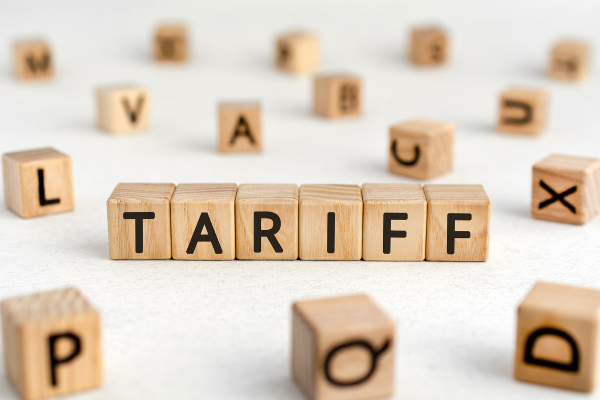BY:
SHARE:

Duty suspensions help UK and Crown Dependency (Guernsey, the Isle of Man and Jersey) businesses remain competitive in the global marketplace. They do this by suspending import duties on certain goods, usually those used in domestic production.
A good example is suspensions on fruit puree, juices and certain additives used in manufacturing food and soft drinks. If you look at the specific instance of Cranberry juice, the MFN rate is 16%, but the tariff suspension, which is an Erga omnes autonomous tariff suspension (meaning open to all), reduces the rate to 0%These suspensions do not apply to other duties that may be chargeable, like VAT or trade remedies duty, such as Trade remedies (formally known as anti-dumping duties).
Duty suspensions allow unlimited quantities to be imported into the UK at a reduced tariff rate. Autonomous tariff quotas (ATQs) allow limited quantities to be imported at a reduced rate.
Duty suspensions and ATQs are temporary and can be used by any UK business while in force. They are applied on a ‘Most Favoured Nation’ (‘MFN’) basis. This means that goods subject to these suspensions or quotas can be imported into the UK from any country or territory at the specified reduced tariff rate. When more than one tariff concession applies, importers will wish to ensure that their goods are entered at the most advantageous rate. So, for example, if there is a reduced rate under preference that is higher, you should choose to clear against the suspension or ATQ if the rate is lower.
Current duty suspensions
If a tariff suspension exists, it will show when you check the commodity code.
Duty suspensions for products previously existing in the UK under the EU suspensions regime have been carried over into the UK’s independent regime. They have been retained, provided they came into force before, or as part of, the EU’s July 2020 update to ensure continuity for UK businesses.
All current duty suspensions rolled over from the EU regime (including EU Autonomous Tariff Quotas, which changed to duty suspensions) are extended until 31 August 2024
.
Apply for a new duty suspension.
The 2023 application window for new duty suspensions has now closed. The deadline for applications was 11:59 pm on Sunday, 6 August 2023. The government has received 245 applications.
A 4-week objections window is live and will close at 11:59 p.m. on Wednesday, 18 October.
The government has published a list of all products and HS commodity code classifications on which suspensions are being considered due to this year’s application process.
- Notice of UK duty suspensions: 2023 application window (ODS, 27.9 KB)
The criteria and examples of the broader considerations the government will consider when assessing applications are set out below.
The wider public is invited to submit any objections they might have on the proposed suspensions via the objections form on Qualtrics.
The list published in the objections window does not indicate whether an application has been successful. The government will confirm the outcome of all applications received in due course.
How the government will assess applications in 2023
Applications submitted as part of this process need to meet both of the following criteria:
- the product you are seeking a suspension on should not be traded between persons who are related parties (defined in Regulation 8(4) of the Customs Tariff (Suspension of Import Duty Rates) (EU Exit) Regulations 2020) in circumstances which would not enable other United Kingdom businesses to benefit from the suspension
- the same product (falling under the same commodity code) or similar products should not be produced in the UK or Crown Dependencies, not produced in sufficient quantities, or production should be temporarily insufficient. (Products other than raw products are taken to be produced in the UK or a Crown Dependency if they are partly or wholly manufactured in the UK or a Crown Dependency. Simple assembly operations, repacking products, or preparing products for shipment or transportation would not usually be considered production processes)
The government strongly recommend you ensure your application meets these criteria. If these criteria are not met, your application may not be considered.
Tariff suspensions help UK and Crown Dependency businesses remain competitive globally. They do this by suspending, in whole or in part, UK Global Tariff import duties on certain goods, usually those used as inputs into domestic production processes.
When assessing applications, the government will also take into account relevant considerations.
These may include:
- international arrangements to which the UK is a party (for example, free trade agreements)
- factors such as:
- the interests of consumers in the United Kingdom
- the interests of producers in the United Kingdom of the goods concerned
- the desirability of maintaining and promoting the external trade of the United Kingdom
- the desirability of maintaining and promoting productivity in the United Kingdom
- the extent to which the goods concerned are subject to competition
- how other government policies may be affected by the proposed duty suspension (such as trade remedies)
- any circumvention risks due to tariff reclassification
So, as an example, if your production is dependent on a particular commodity that cannot be obtained within the UK and would not cause injury to a UK business (injury being you import the product at a lower price than the UK entity can sell for), it can be considered.
The outcome of the 2021 duty suspension window
The government invited applications for duty suspensions between 1 June and 31 July 2021. As a result, over 100 measures were implemented on 1 January 2023.
Coronavirus (COVID-19) critical products
The UK government implemented tariff suspensions on several medical items critical in responding to COVID-19 on 1 January 2021. In October 2021, the government also introduced additional suspensions on 14 COVID-19 vaccine components. The government has extended the suspension of import duties for most of these products until 31 December 2023. Three suspensions will expire for goods with no imports under the suspensions (5603 91 10, 2905 44 11 00 and 2905 44 99 00). This is based on HMRC raw customs data from January 2021 to August 2022.
Sunflower-seed oil
The UK government will implement a tariff suspension on sunflower-seed oil on 1 January 2023 in response to supply chain disruption. This measure will take effect until 31 December 2024.
Current ATQs
The UK currently has six existing ATQs:
- 5 ATQs for fish products
- 1 ATQ for raw cane sugar
Read more details on these products:
- List of autonomous tariff quotas (ODT, 29.6 KB)
ATQs for fish products
4 ATQs for fish products will continue at current volume levels until 31 December 2024. These will be reviewed ahead of that date.
ATQ order number 05.2794 is set at 6,500 tonnes for 2023.
ATQ for raw cane sugar
The UK implemented an ATQ on raw cane sugar on 1 January 2021. Following a subsequent review of all UK ATQs in 2021, we maintained the volume level of the ATQ at 260,000 tonnes.
In the context of domestic supply challenges and significant increases in sugar prices, the Government would welcome information from stakeholders to understand any issues this has caused in the UK sugar market and potential mitigations that the government could take. They would welcome input and evidence available, where appropriate, on:
- the exact size of the shortfall in supply in the EU/UK
- the extent to which imports from preferential sources, including countries eligible for the Developing Countries Trading Scheme, can increase to meet the shortfall.
- the degree to which consumer prices would be affected by the application of the out-of-quota tariff rate of £28/100kg if supply shortages mean imports must increase such that quotas available are not sufficient to meet domestic demand.
- the extent to which uncertainty around fluctuations in the world sugar price relative to the EU/UK sugar price and about pass-through of price increases across supply chains affect consumer prices.
Two potential options that are open to government in this space are:
- not making any tariff changes for the remainder of this year
- increasing the raw cane sugar ATQ to an appropriate level for the remainder of 2023
Other options open to the government could be explored. This includes, for example, a temporary tariff suspension for the remainder of this year only on raw cane sugar for refining, and we also welcome views from stakeholders on any broader options available for consideration. None of these options reflects a government position; any decision will be made based on stakeholder feedback and more general government objectives.
OneCall™ Email assistance as and when required; A one-call solution for all your import, export and customs enquiries. Export help. Import help. Customs help.
Stay informed about customs and international trade matters by subscribing to our OneCall™ service. This comprehensive offering includes a dedicated email helpline for support, timely practical updates direct to your inbox (Did You Know?), monthly UK Customs & Trade Briefings and access to an interactive members' area with an exclusive community for our subscribers.
International Trade Updates & Spotlight Newsletter
Subscribe to our free information emails covering international trade topics...
MORE INDUSTRY INSIGHTS...









